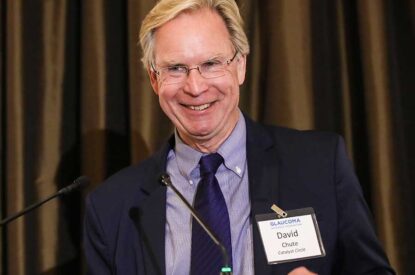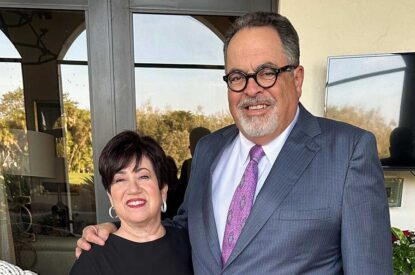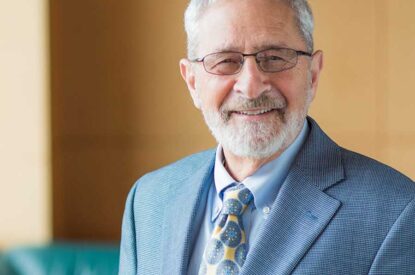Thomas Brunner – For almost 50 years, Glaucoma Research Foundation has led the way as the nation’s first nonprofit dedicated solely to curing glaucoma. From the beginning, we’ve been pioneers in advancing research, elevating patient care, and empowering our community through education and support. We invest in transformative research and work hard every day to create a future free from glaucoma.
Amanda Eddy – My name’s Amanda. I’m a glaucoma patient, I’m a mom, I’m a small business owner, and I’m a jewelry designer. I was born with glaucoma, so it’s been a really big part of my life.
Thomas Brunner – Over the years, Glaucoma Research Foundation has sparked discoveries that have transformed the way we understand and treat glaucoma. We pioneered a collective research model, the first prospective randomized multicenter clinical trial, to show that lowering eye pressure prevents vision loss. Our collaborative Catalyst for a Cure teams and Shaffer grants have fueled breakthroughs and helped launch the careers of many of today’s leading glaucoma researchers.
Carla Siegfried, MD – Our receipt of the Shaffer grant had a tremendous impact on the next decade of my research career.Glaucoma Research Foundation allowed us to take that step, really to follow our curiosity.
Karthik Shekhar, PhD – I came to know of this opportunity through my mentors. They told me about the Catalyst for the Cure. This was an opportunity that brings together scientists with very different skill sets in a collaboration in the context of glaucoma.
Yang Hu, MD, PhD – My lab is majorly focused on glaucoma, neurodegeneration diseases, and associated optic neuro diseases. Individual labs always have limited results, limited expertise. And at some point, if we want to answer some tough questions based on the previous significant work, we realized that only neuroprotection and regeneration can solve this neurodegeneration disease.
Amanda Eddy – So the idea of finding a cure one day in my lifetime, or even being able to restore sight that’s been lost is, I mean, it’s everything.
Thomas Brunner – From identifying the first gene responsible for certain forms of juvenile and adult glaucoma to establishing that glaucoma is a neurodegenerative disease and discovering new biomarkers that can accurately track disease progression. These landmark achievements have not only advanced our understanding of glaucoma but have also empowered our teams to advance the science faster than ever before.
Karthik Shekhar, PhD – Glaucoma is a complex disease, and to understand this complexity, we need technologies and tools to measure many, many, many, many, many, many variables. Modern day advances in statistical inference, machine learning, and AI — all these are essentially intelligent ways to analyze these data, to identify subtle patterns that can ultimately translate into a therapeutic that will work at the clinic.
Yang Hu, MD, PhD – We set up this goal. We want to achieve neuroprotection. We probably already have the breakthrough in the lab, but we have to demonstrate that it’s really beneficial for human patients. That’s the step we are really working on with the support of GRF, especially with the GRF Accelerator program.
Thomas Brunner – Our new Treatment Accelerator bridges that critical gap, providing the funding and support needed to turn breakthrough science into real therapies that can be tested, approved, and delivered to patients faster than ever. With your support, we can expand this initiative and bring more life-changing discoveries to the finish line. We are so close. Now is the moment to make sight-saving treatments a reality.
Yang Hu, MD, PhD – Patients are waiting for us. “What you are doing is really meaningful.”
Carla Siegfried, MD – I always have the patient in mind as we continue these research pursuits.
Amanda Eddy – Finding a cure would just give you this amazing sense of relief like I can see now for the rest of my life. I don’t have to worry about it. That would be everything, it truly would.
Carla Siegfried, MD – I have seen the impact of glaucoma on patients and their families. I know that every day that I spend in the laboratory, I can make an impact on all of them.
Amanda Eddy – I’m so thankful for donors and people that really give, because you’re really helping patients like me see for a very long time, and it’s so appreciated.
Carla Siegfried, MD – Everything that we do in the lab and bringing our understanding of glaucoma to a higher level requires a great deal of resources, and those who do contribute to Glaucoma Research Foundation can truly make a difference.
Karthik Shekhar, PhD – While I feel very humbled that I’m part of this, I’m also extremely committed and excited to continue the work that is being supported.
Yang Hu, MD, PhD – Because of their generous support, we are really approaching to the end point to achieve the goal of neuroprotection.
Amanda Eddy – I really, truly feel like the cure is going to happen in my lifetime, and it’s thanks to people in this room just like you.
Thomas Brunner – Today, we stand closer than ever to a cure, closer to therapies that protect and restore vision, and to a global community united to end this disease. With your partnership, that future is within reach. This is the defining moment. The time is now. Together, the cure is in sight.
End transcript.



